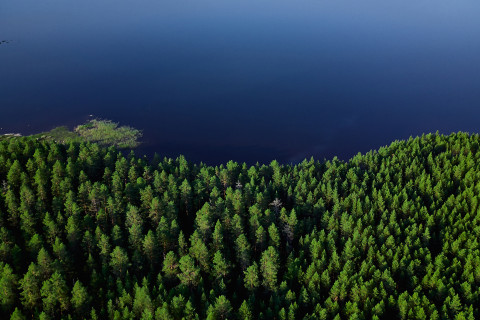The doctoral dissertation in the field of Physical Geography will be examined at the Faculty of Social Sciences and Business Studies at Joensuu campus.
Why is it important to study the topic?
The topic of my doctoral research centres around the utilization of global remote sensing data products to assess environmental changes occurring at both regional and local scales. To achieve this, we conducted an in-depth study at two distinct case study sites, each representing extreme environmental conditions: the arid tropical Zambezi region in Namibia and the boreal setting of Lake Ladoga in Russian Karelia. Our observations revealed significant ecological shifts, predominantly driven by anthropogenic activities. As we navigate the challenges posed by climate warming, it becomes increasingly crucial to continuously monitor these changes. By doing so, we enhance our understanding of the underlying processes and the interacting factors responsible for these shifts. Ultimately, this knowledge informs the development of effective management strategies to safeguard our environment.
What are the key findings or observations of your doctoral research?
The culmination of the four published works underscores the pivotal role of global remote sensing data products in monitoring and characterizing environmental changes. These findings illuminate the intricate interplay between natural processes and human activities, yielding both positive and negative outcomes. In the first article, we unearthed a gradual decline in vegetation cover within the Zambezi region. The study pinpointed several key drivers behind this reduction, including peasant farming, population growth, and deforestation. Delving deeper, our third article shed light on the human-wildlife interaction dynamics driving vegetation loss. Along migratory elephant routes and near large herds, vegetation suffered widespread decline. Artificial barriers, such as fences, and the shrinking of elephant habitats emerged as significant factors in this ecological shift. Shifting our focus to Lake Ladoga, the second article and fourth (book chapter) revealed a gradual decrease in chlorophyll-a concentration. This trend suggests a moderate improvement in the lake’s water quality. Interestingly, the study also uncovered a phenomenon of hysteresis, attributed to nutrient release from the lake’s internal storage. In summary, our research underscores the urgency of continuous environmental monitoring. By unravelling these complex dynamics, we pave the way for informed management strategies that safeguard our planet’s delicate balance.
How can the results of your doctoral research be utilised in practice?
The findings of my research can serve as valuable reference to develop a multidisciplinary theoretical framework for future studies. A more vigorous study and understanding of the underlying anthropogenic processes and how these are driving land degradation is needed in promoting improved policy-driven, decision-making and management strategies.
What are the key research methods and materials used in your doctoral research?
In general, the overall theme in all four research papers is global remote sensing data. The data I used included satellite data products with temporal (up to 34 years) and spatial (250 m to 8 km) resolutions. We also collected field data that included aerial images (with 2cm resolution) and video recordings obtained using Unmanned Aerial Vehicles (UAV) otherwise known as drones, GPS-collared elephant information, and GPS (latitudes and longitudes) locations of sample points. In addition, we visited populated and sparsely populated settlements, forest reserves, and national parks. During these visits, we conducted a visual assessment of the surrounding vegetation structure, elephant damage, agricultural activities, and infrastructure development (e.g., roads and settlements). We used a combination of geostatistical and remote sensing techniques to carry out a pixel-wise time series analysis to identify long-term trends present in the data.
Further information:
Augustine-Moses Gaavwase Gbagir, [email protected], +358 504310786
The doctoral dissertation of Augustine-Moses Gaavwase Gbagir, MSc, entitled Using Long-term Global Remote-Sensing Datasets to Assess Environmental Changes at a Local and Regional Scale will be examined at the Faculty of Social Sciences and Business Studies. The Opponent in the public examination will be Professor Risto Kalliola of the University of Turku, and the Custos will be Professor Alfred Colpaert of the University of Eastern Finland.
